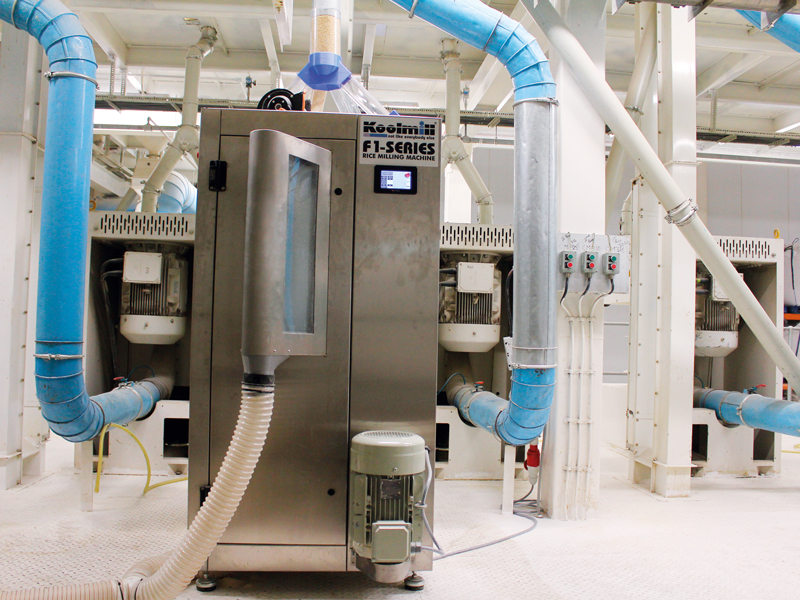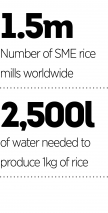New rice-milling solutions could give a boost to SME mills
Traditional rice mills can’t access modern equipment, resulting in food loss. Koolmill’s disruptive technology enables all rice millers to replace antiquated equipment with a simpler next-generation mill

Koolmill produces more food from existing harvests with less power, less loss and less damage by integrating simpler, distributed storage and milling solutions at mills
Globally, there is a relatively small number of large commercial rice mills producing more than 100 tonnes of product per day – fewer than 50,000, in fact. These mills perform well and use less power for each tonne milled (around 40kWh) than small and medium-sized enterprise (SME) mills, which use around 80kWh per tonne milled. However, larger mills require lots of capital to build, operate and maintain, and also require substantial quantities of rice in order to operate at a cost-effective level.
There are some 1.5 million SME mills worldwide that mill under 100 tonnes of rice per day. Many of these smaller mills do not benefit from modern milling solutions due to their existing infrastructure, limited capacity and lack of finance to reinvest. Thus, SME mills are locked in a perpetual cycle of operating destructive, antiquated machinery, or are forced to replace like-for-like, having little choice but to opt for cheap and poor-performing machinery.
Over 90 percent of the $4bn of projected sales of rice-milling equipment between 2018 and 2023 will be from machinery largely superseded in the 1980s. Outdated machinery is both ineffective and wasteful; a modern mill can return 70 percent of milled rice (both broken and unbroken) from paddy. Meanwhile, according to the Institute of Mechanical Engineers in its Global Food: Waste Not, Want Not report, using poor storage and old machinery can cause up to 80 percent of the entire rice crop to be lost post-harvest. These losses are unsustainable with a growing
population and demand.
Over 90 percent of the $4bn of projected sales for rice-milling equipment between 2018 and 2023 will be from machinery superseded in the 1980s
Empowerment through technology
Koolmill provides empowering technology that enables efficient distributed milling on demand and at the point of use. We address three key problems in milling: lowering power consumption, quantitative improvement (more milled rice from the same input) and qualitative improvement (the milled rice is of a higher quality). As such, Koolmill produces more food from existing harvests with less power, less loss and less damage. By integrating simpler distributed storage and milling solutions, we are working to minimise these post-harvest losses, thereby maximising the return of food and high-value by-products from bran and husk. This is vital, because modern rice mills can’t be efficiently scaled down to meet the needs of SME mills. Indeed, there is now a push for larger mills to reduce the cost of production, which requires the trucking in and redistribution of massive quantities of rice.
Heavy losses occur throughout the lengthy rice value chain. Our technology helps to prevent this by shortening and rebalancing the existing value chain to minimise the interface losses in transportation. Improving the storage and transportation of rice and maximising the return of undamaged rice from milling will contribute to significantly less food loss.
Essentially, we seek to create shared value, to retain value locally and to distribute it more equitably between stakeholders in a shortened value chain. What’s more, Koolmill is affordable, accessible and available to all millers, regardless of size or location. It provides SME mills with the opportunity to transition from low-value commodity producers to value-added, market-leading food producers.

We also contribute to 16 of the 17 Sustainable Development Goals set by the UN. Koolmill is driven by its vision and values – we believe that sustainable employment produces improved economic opportunities, leading to higher incomes which, in turn, improve education and nutrition, and contribute additional tax revenue for local economies.
Market focus
China is the largest rice market globally, and demand is growing. The support we have seen in China, both through grants from the government and private investment, has enabled us to progress there. We have also just embarked on a two-year Newton Project, supported by Innovate UK and the Chinese Government, further extending our activities in the country.
There are other markets that also show great promise. On August 31, 2019, we completed an Innovate UK Newton Bhabha Fund project in India, working alongside local academic, manufacturing and milling partners. The Indian rice market is the second-largest globally and is currently more advanced than the Chinese market, making it our primary target market.
We have patents covering over 70 percent of global rice production and will launch our services to key markets such as Indonesia, the Philippines, Vietnam, Thailand, Myanmar, Sri Lanka, Greece, Turkey, Brazil and the US, as resources allow. Key to this roll-out is our established global network of collaborative partnerships, including academic, manufacturing, technological and milling partners, as well as our proven unique selling points and novel pay-as-you-mill business model.
Food security
The Food and Agriculture Organisation of the UN estimates that rice production will need to increase by 70 percent in order to satisfy demand from the growing global population, which is estimated to reach 10 billion by 2050. This need is set against the backdrop of decreasing harvest yields, as well as extreme weather events, which put stress on farmland. Yet, the annual triple bottom line (people, planet and profit) loss from rice globally is estimated at $127bn. It takes 2,500 litres of water to grow 1kg of rice, but each year some 60 billion kilograms will be lost post-harvest thanks to poor storage and ineffective milling. The input cost of this rice – land, water, seeds, chemicals, power, fuel and labour – lost post-harvest each year amounts to $14bn.
Koolmill, and project partners Siemens, Sheffield Hallam University and Aston Business School, are pioneering the introduction of a fully digital and affordable auto-tuning rice-milling solution, available to millers through a unique business model that effectively allows SME millers to pay as they mill.
After 150 years of mechanised milling, Koolmill’s technology is recognised as the third generation of milling technology. We are at the start of a very long road of innovation and development, driven by a mantra of producing more by milling less. Koolmill’s vision is to transform an antiquated and wasteful global industry, move it to a sustainable future and lift millions from poverty.
Our primary objective is simple: create and build momentum to move towards delivering our vision. Through this, we will create a profitable, global business that has a positive impact economically, socially and environmentally.













